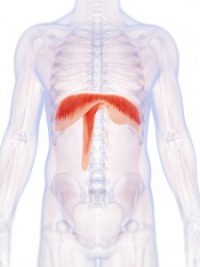
WHAT IS CCHS?
Congenital Central Hypoventilation Syndrome (CCHS) is a rare disorder of respiratory control. Patients with CCHS have difficulty breathing because the part of their brain that controls respiratory function is impaired, which results in the brain not telling the body how fast or how deep to breathe. Once a patient is diagnosed with CCHS, lifelong care is typically necessary. The level of care is based upon the severity of the case, with severe cases often requiring around-the-clock respiratory intervention. Patients with less severe cases may only need assistance while they sleep, due to the apnea that occurs because of the impaired respiratory function.
TREATMENT OF CCHS WITH DIAPHRAGM PACING
Today, patients with CCHS may receive respiratory support with a technique called diaphragm pacing. Diaphragm pacing uses the patient’s own diaphragm as a ventilator. The pacing system requires the surgical implantation of an electrode behind the phrenic nerves. An external device uses electrical energy to stimulate the phrenic nerves causing the diaphragm to contract which then draws air into the body. Diaphragm pacing is an alternative to positive-pressure ventilators in which the patient needs permanent tracheotomy tubing. Unlike a ventilator machine, a diaphragm pacemaker can be carried in a small backpack or fanny pack allowing the CCHS patient to participate in everyday activities.
THE AVERY DIAPHRAGM PACING SYSTEM SYSTEM
The Avery Diaphragm Pacing System System is the only diaphragm-pacing device with full pre-market approval from the FDA. In addition, its system of using small implanted radiofrequency receivers rather than electrode wires that pass directly through the skin may decrease a patient’s risk of infection and ongoing wound care management issues.
The Avery Diaphragm Pacing Systems are the only device with full PMA FDA approval and are CE marked under the European Active Implantable Medical Device Directive. Also it is the only device approved for both pediatric and adult patients. The youngest patient ever implanted was 56 days and the oldest was 84 years. In addition, using fully implantable receivers, the Avery System does not have wires protruding through the skin which may result in chronic infection and ongoing wound care. Moreover, the Avery system is not contraindicated for patients with cardiac pacemakers. Learn more about the Avery Diaphragm Pacing System System.

